There are over 1,500 dating apps and websites operating worldwide at the moment, and this market is projected to reach $9.2 billion by 2025.
What if you had an app that tells you whether the match is your true love or a dream date?
AI dating apps might make it possible sooner than later. The question remains about how much technology is too much, especially when you add emotions to the mix.
Can AI be the great facilitator of matchmaking in the modern world? Should you let algorithms choose your partner?
We decided to find out.
So, we surveyed 1,191 people and found the answers to the following questions:
- What frustrates people when it comes to online dating
- What features would the perfect dating AI app have
- What private data people are ready to trade for a promise of a perfect partner
- Are people willing to trust dating apps more than they trust their intuition
And many more.
Learn how to implement AI-powered customer service today
Love in the age of AI dating apps: major findings

Our survey revealed that:
As many as 52% of our respondents use dating apps regularly
Surprisingly enough, married people are the ones to admit using a dating app at least once a month (33%) or at least once a week (26%). It’s comparable to respondents who are in an open relationship/marriage (36% admit using the dating app once a month).
This is in line with research by GlobalWebIndex claiming that around 30% of Tinder users are married.
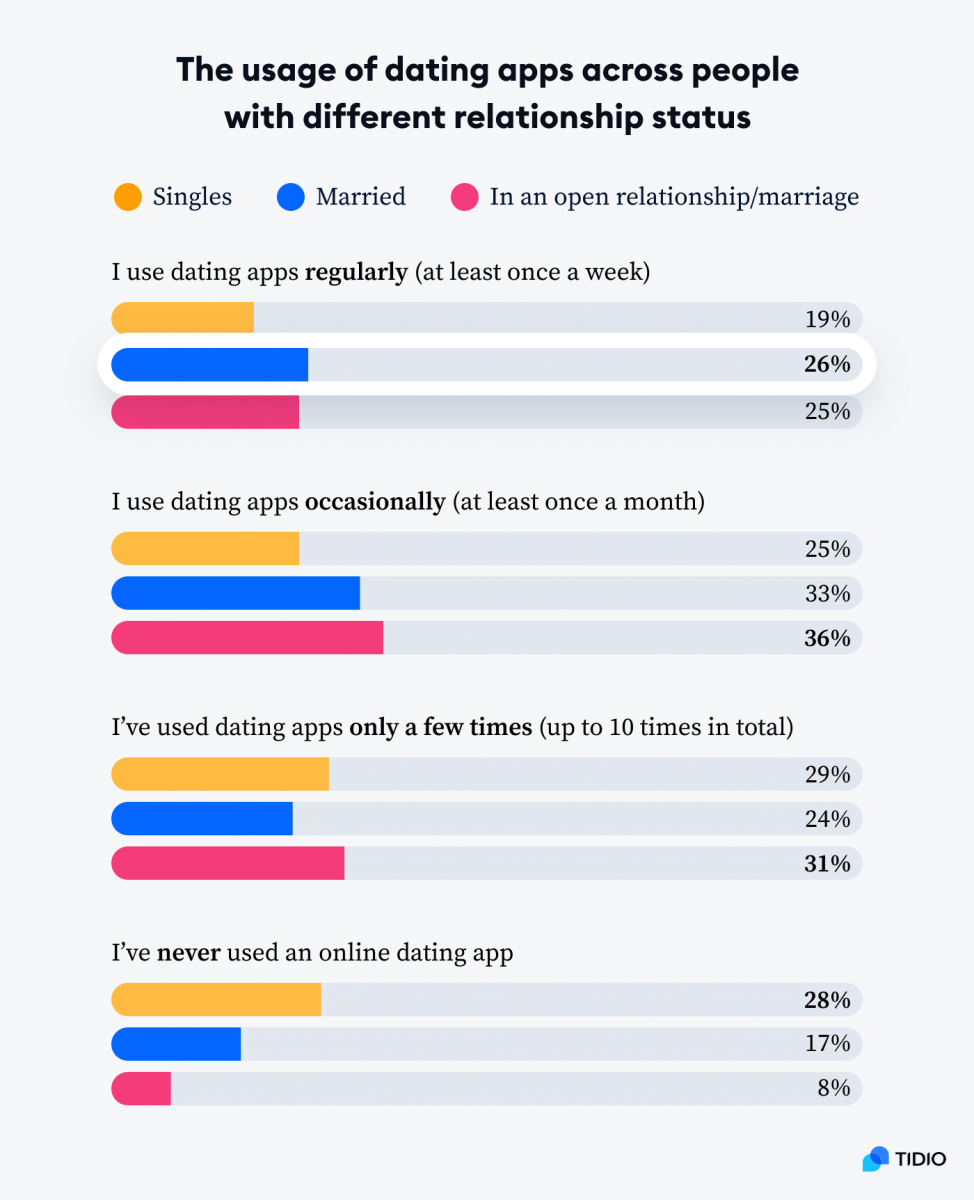
Almost 29% of single respondents, on the other hand, claim to have used a dating app only a few times in total, and 28% of them said they have never used an online dating app before.
According to a marital satisfaction study conducted at University of Chicago, they should consider giving it a shot.
The study revealed that people who meet online, are less likely to get divorced and are generally happier with the state of their marriages. We are not sure, though, if it includes those who go out on dates with others while being already married.
As many as 33% of Gen Z-ers claim to have never used an online dating app
Even though Gen Z is said to be the most technologically savvy generation, it looks like they are not the ones to trust apps with their love lives. As many as 33% of them admit to never having used an online dating app, and 29% claim to have used it up to 10 times in total.
On this front, they seem to be more in line with Gen X, out of which 31% claim to have used an app a few times, and 24% admit to using it semi-regularly, at least once a month.
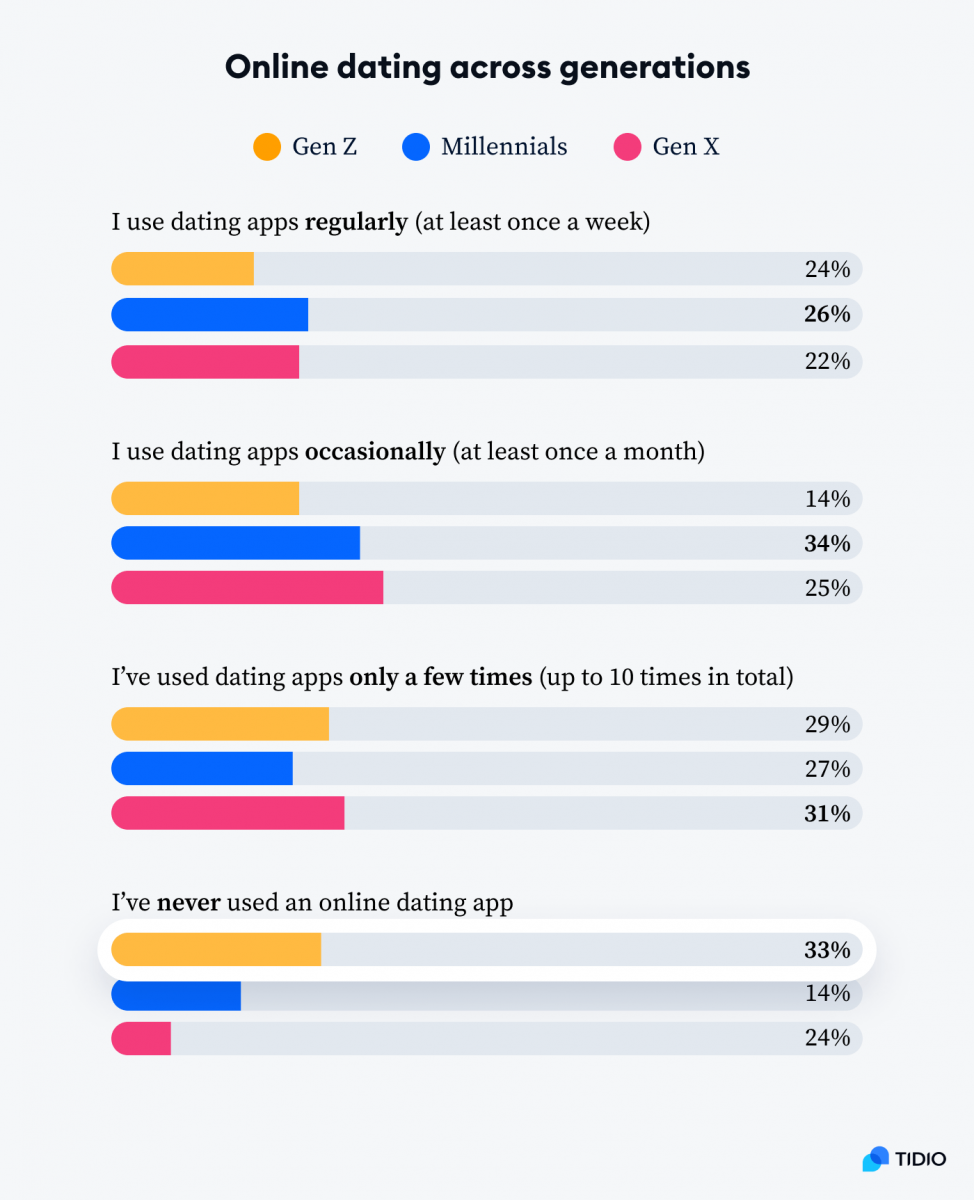
This might be connected with the fact that Gen Z, a generation that grew up in the reality of the 2008’s recession, is said to be more focused on personal development and prioritizing career over settling down.
Only 12% of our respondents are content with their online dating experience
When it comes to the frustrations of online daters, they indicate having doubts whether the partner will look like the person in their photo (25%) as well as fearing to match with profiles that are not real (25%).
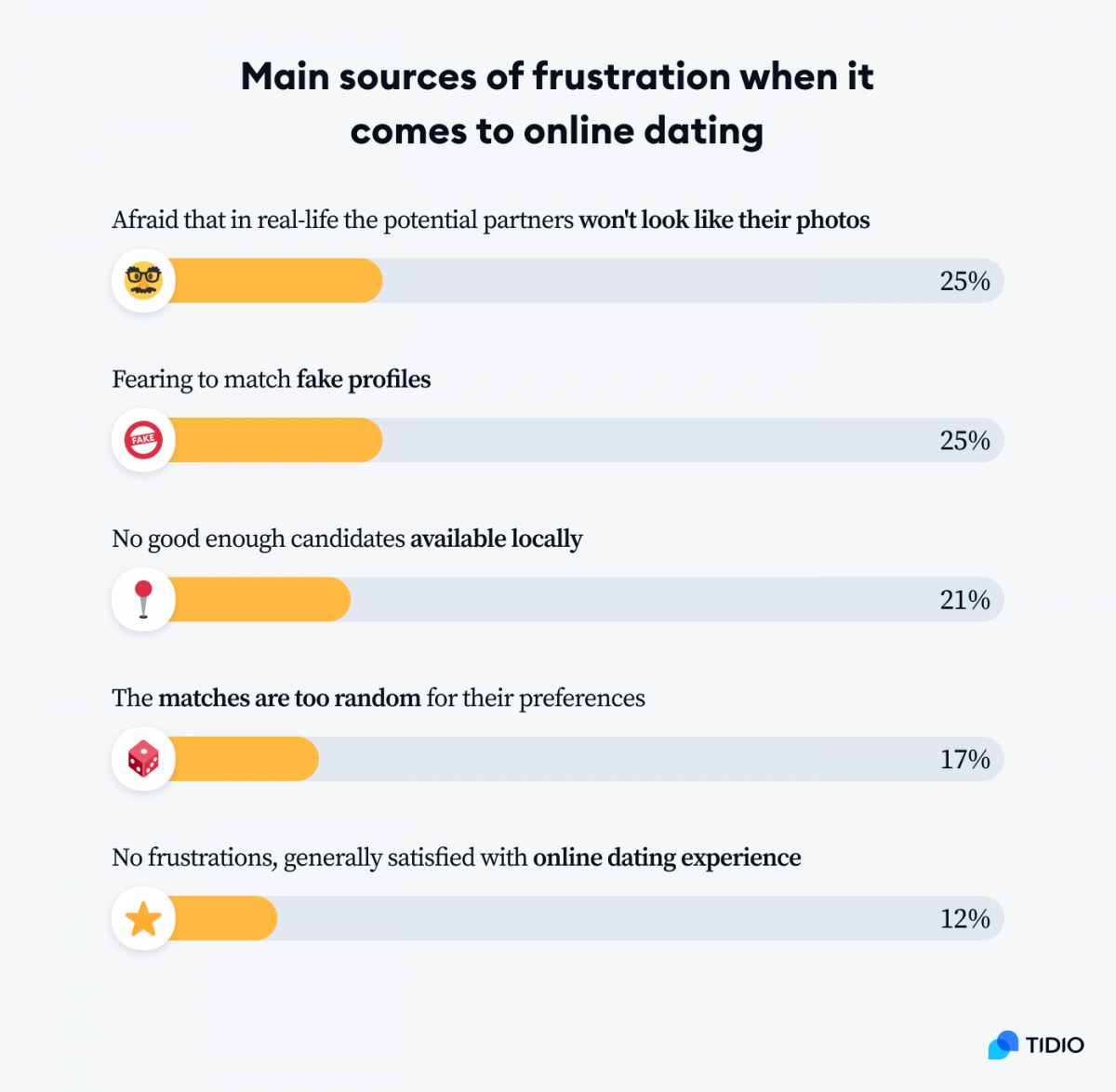
One of our respondents expressed their disappointment by stating that nowadays, people tend to hide behind the screen and do not want to meet in real life.
There might be a good reason why people are fearing to face who’s on the other side. Florida State University research revealed that as many as 77% of women and 66% of men have been a target of catfishing. Moreover, half of the online daters (50%) believe that many people set up fake profiles to scam others.
On top of that, as many as 48% say that receiving sexually explicit messages and images they didn’t ask for, is very common.
Almost half of the survey participants (47%) say they would use an AI dating app to find a potential long-term partner
Making friends (33%) took second place on the podium, while 19% of our respondents would search for casual sexual relationships and hookups.
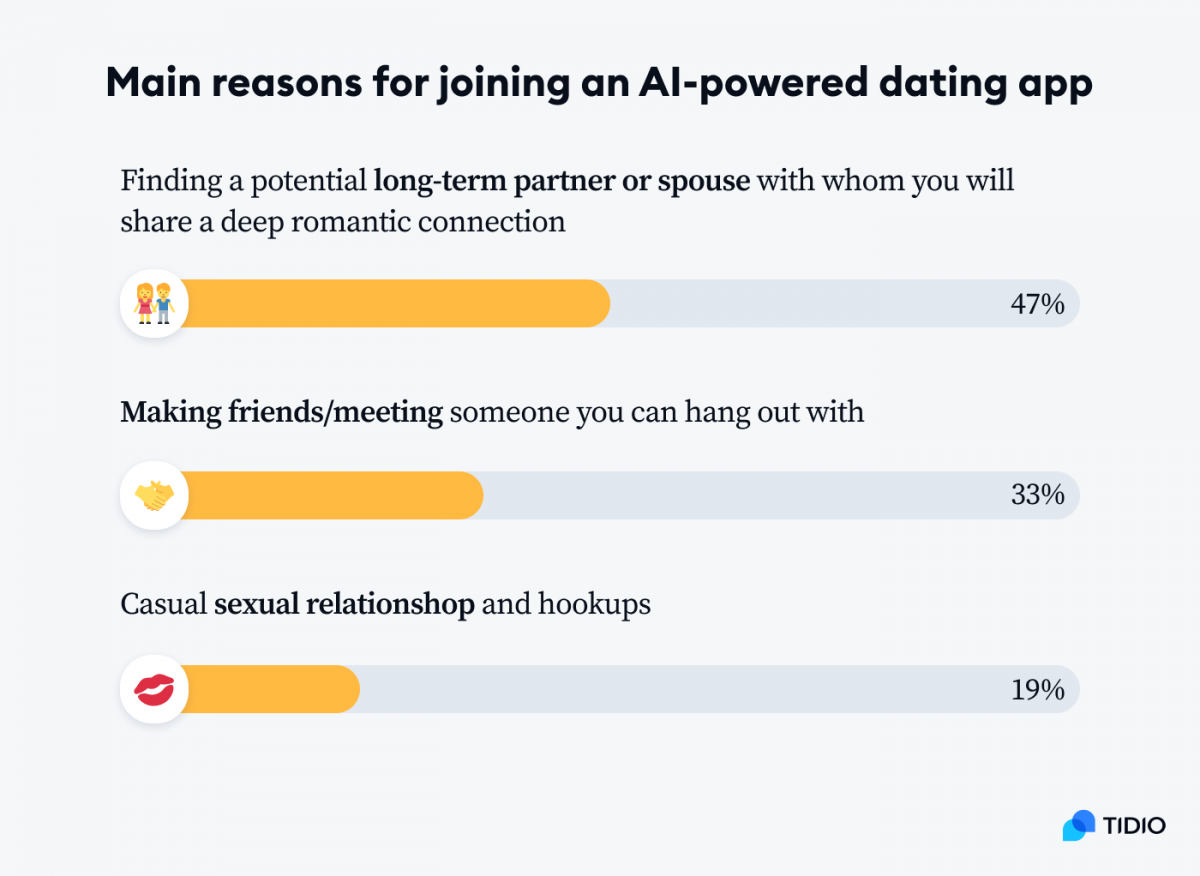
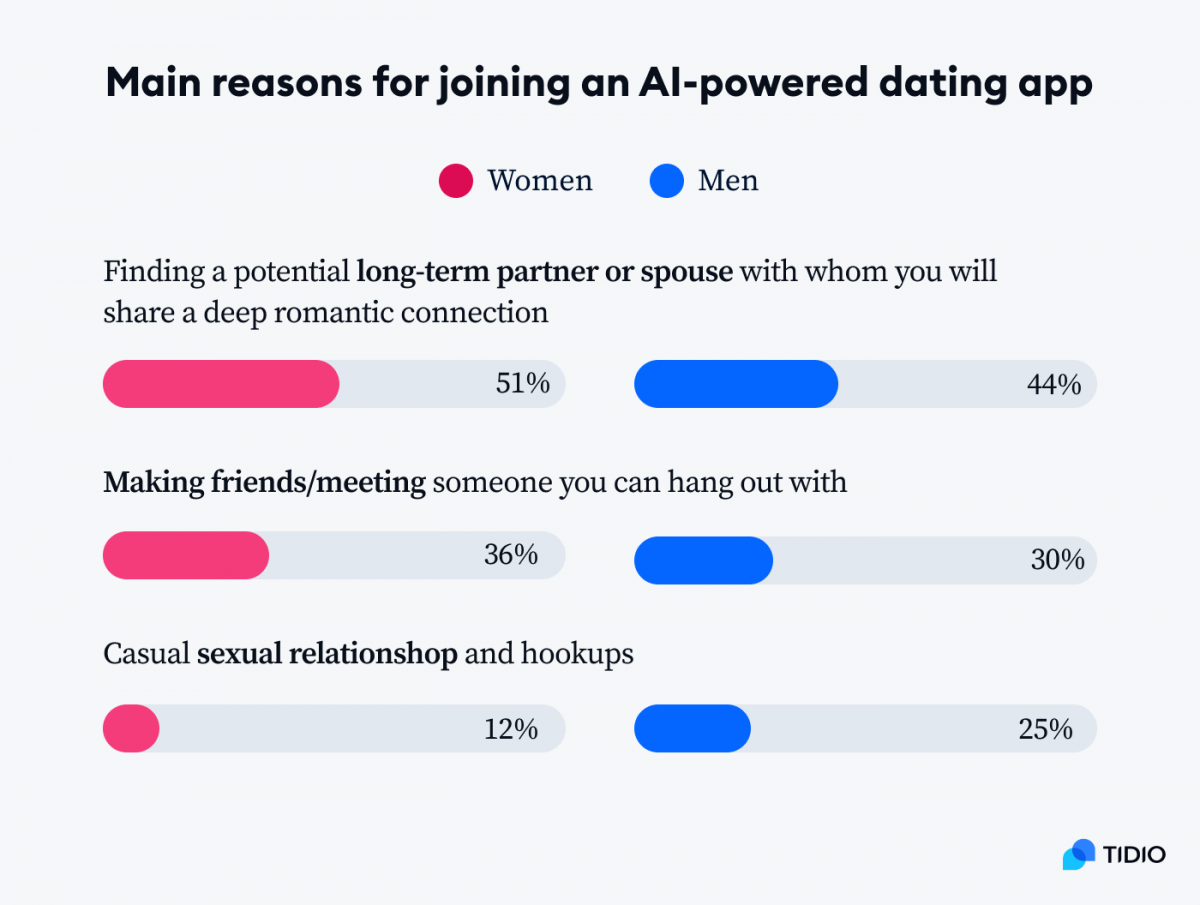
What’s even more interesting, 16% of married women and 24% of married men would want to use an AI dating app to engage in a casual sexual relationship.
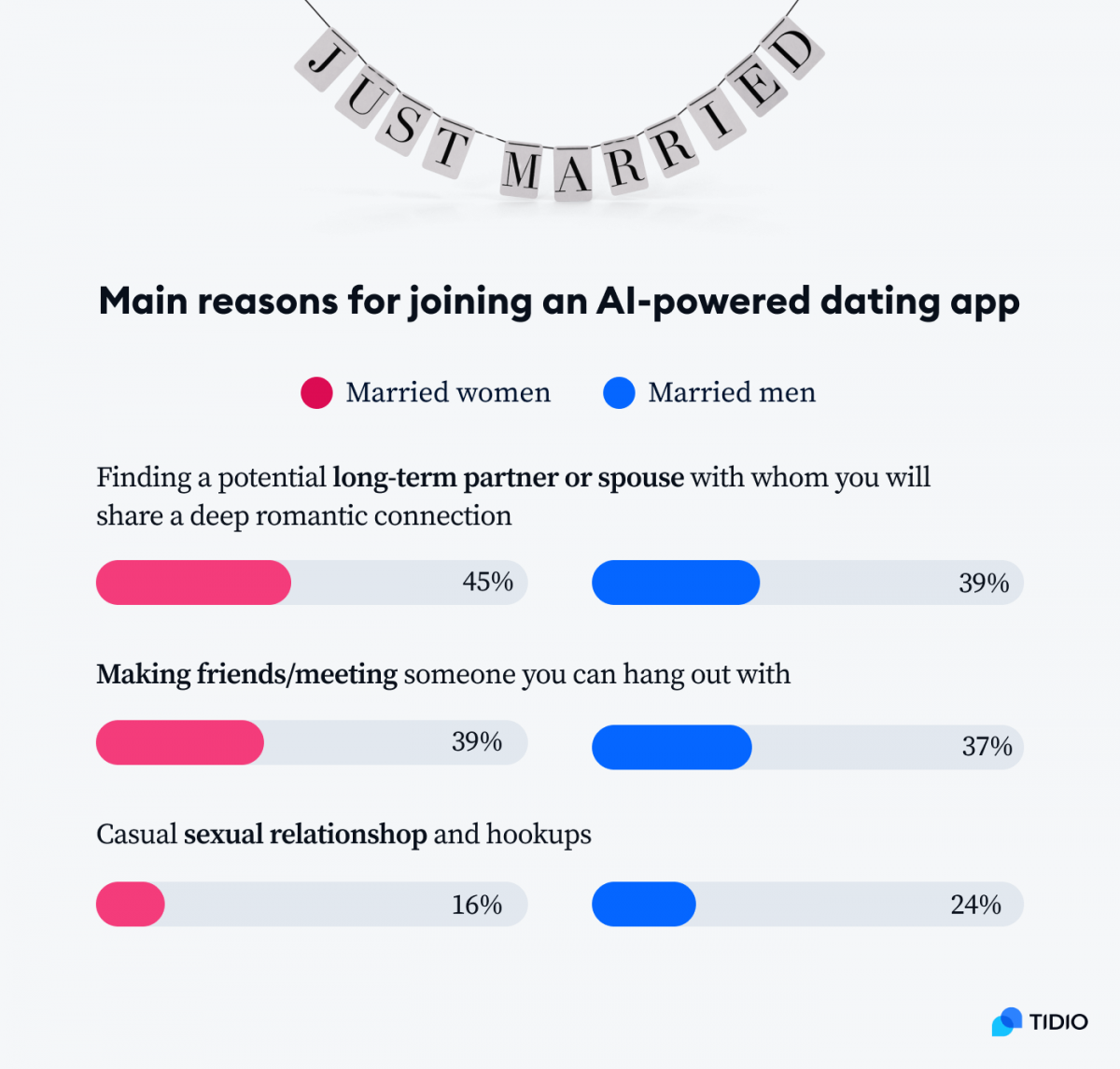
Which features should a perfect, AI dating app have?
Dating AI is supposed to take care of all the small details for us. Tinder’s CEO, Sean Rad, stated that the AI will be the “great simplifier” of matchmaking and “the future of the dating industry.”
DNA Romance goes a step further and claims to have deciphered “the scent of love” by matching partners with their DNA compatibility.
How far is too far? How do people really want to be matched with their potential partners?
Finding a match based on the personalized criteria is the most preferred AI assistance (54% of answers)
At the same time:
- 46% would want the app to analyze their written bio and find someone with common interests
- 45% would want to fill in the visual survey, so the AI will showcase matches they find physically attractive
- DNA matching landed on the last spot (13%)
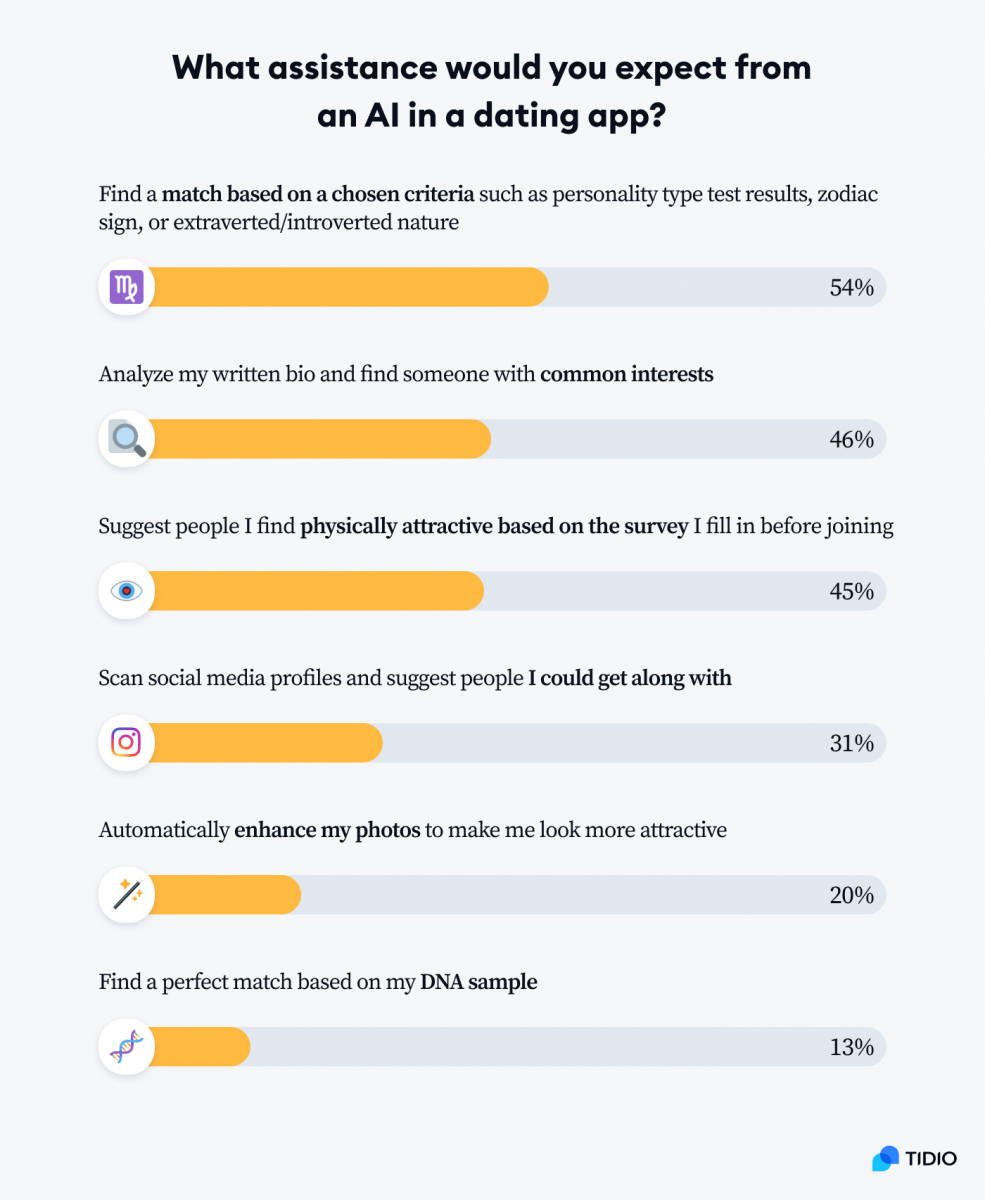
This suggests one thing: people want to meet partners compatible with them in particular aspects they find meaningful—
To some, it may be a personality test showing the unique features of their characters. To others, a zodiac sign, a way of spending their free time, or, physical attractiveness.
However, it turns out that more men are interested in finding the match based purely on the looks, compared to women:
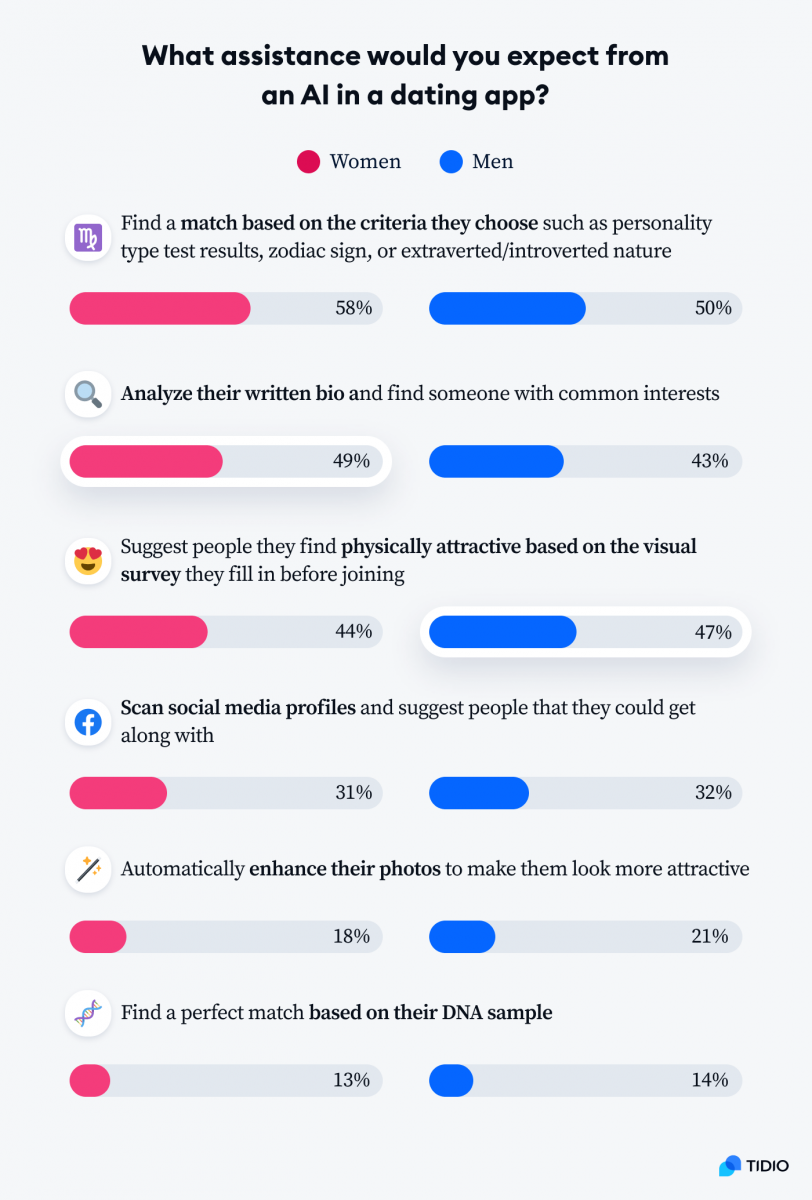
This confirms the claim that for men, looks matter slightly more, while women tend to search for similar interests and hobbies when choosing a partner.
Over half of our survey participants (55%) would want the app to show the matches with the compatibility percentages of various aspects of their choice
Showing only the most compatible candidates is the second most desired feature (41%) and showing the matches found nearby is the third (40%).
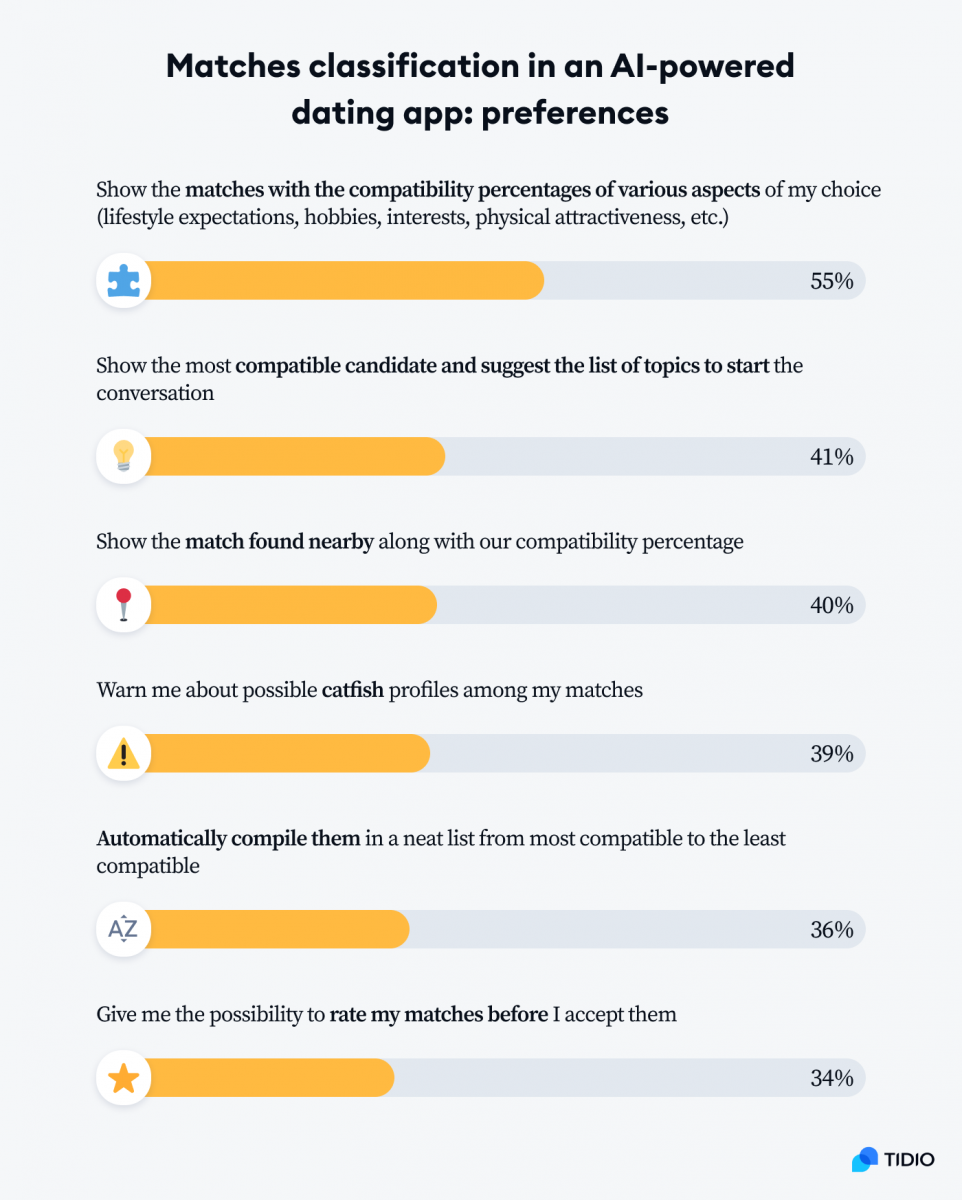
So, does good old personalization and filtering win it all?
Not completely.
eHarmony, a dating service, announced that it’s working on a feature that will nudge the users and encourage them to meet offline. Loveflutter, a British dating app, plans to introduce an option that will analyze the compatibility of the partners based on their conversations.
It’s because both of the dating giants know that when it comes to seducing a potential match— with the looks and the brains—people might need a little bit of help. Our research confirms that, too.
Almost 69% of our respondents would want the AI to analyze their dating profile and suggest the changes that would make it more attractive
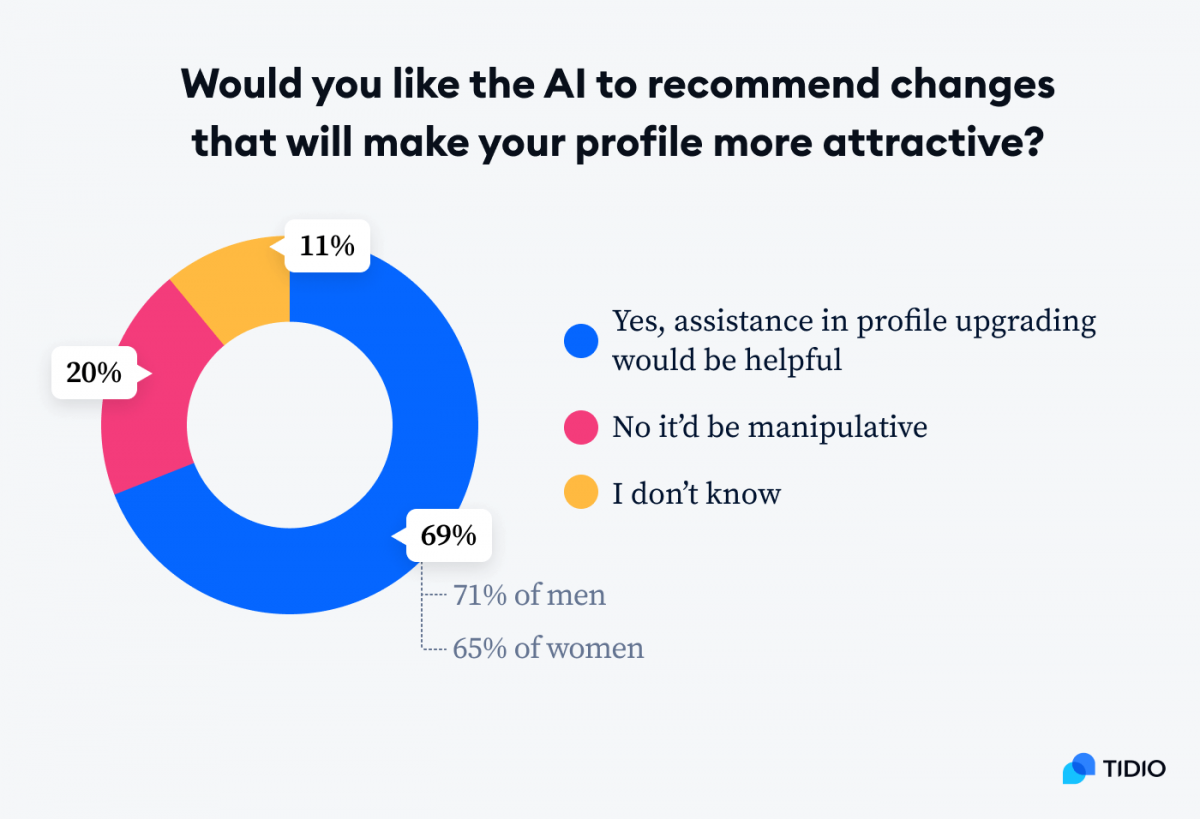
This specific statistic may have roots in our behaviors online. When scrolling through various social media, we are exposed to a highly curated selection of photos and videos. They often depict unattainable beauty standards and extravagant lifestyles.
This may result in a need to appear more attractive, both in terms of physical appearance and lifestyle, in order to find a partner. In fact, 21% of men and 18% of women respondents would want the app to automatically enhance their photos to make them look more attractive.
More than half of the survey participants (56%) would want the AI to provide them with in-app chatting help
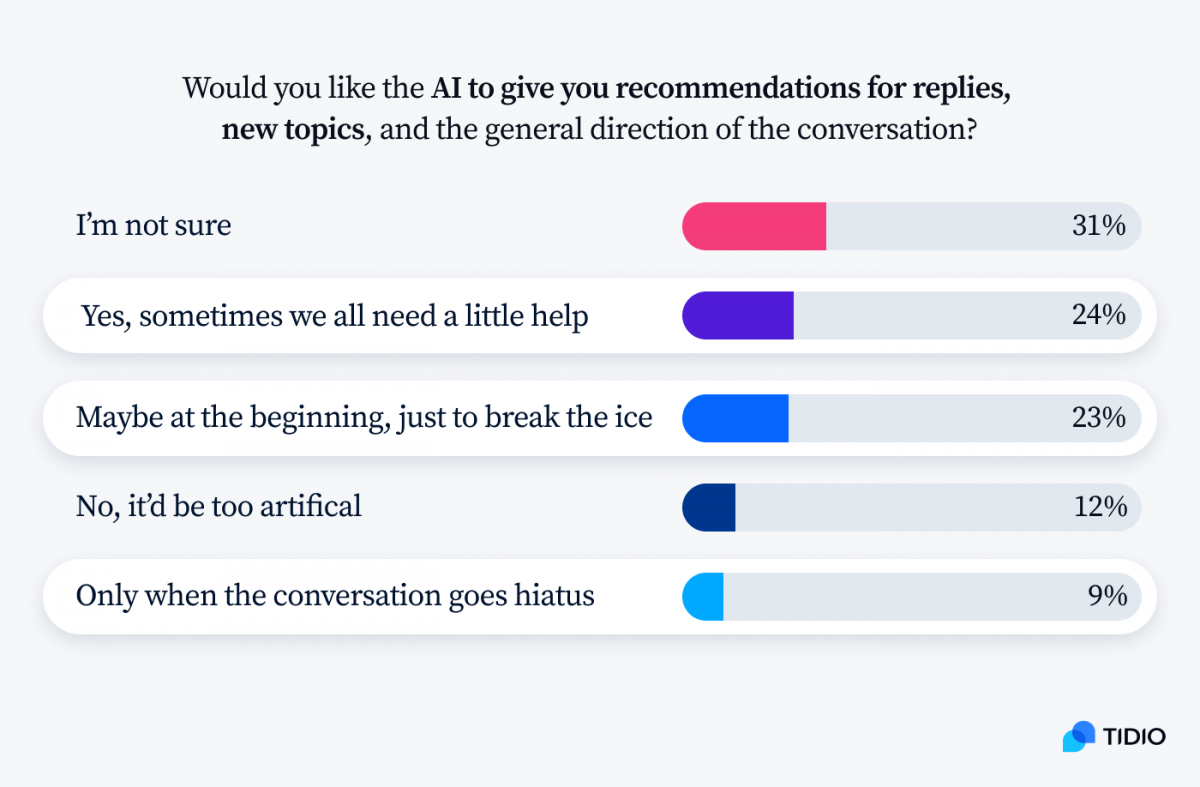
Upgrading the profile and getting the potential matches is just the beginning, after all. Now, you need to establish a connection by doing a very basic human activity—talking.
And anybody can get a bit shy and nervous if they landed the date of their dreams. The solution? AI chatting help. Our respondents confirm: such assistance could be especially helpful at the very beginning (24%), or when the chat doesn’t go as smoothly as planned (12%).
Almost 96% of survey participants would like to have a possibility to train the dating AI
As many as 40% of them would like to upload photos and descriptions of someone they like. To 31% of respondents, scanning the social media of their exes and excluding potentially similar people would be the most useful. However, 25% would want the AI to scan the social media profiles of their exes and find someone who resembles their exes.
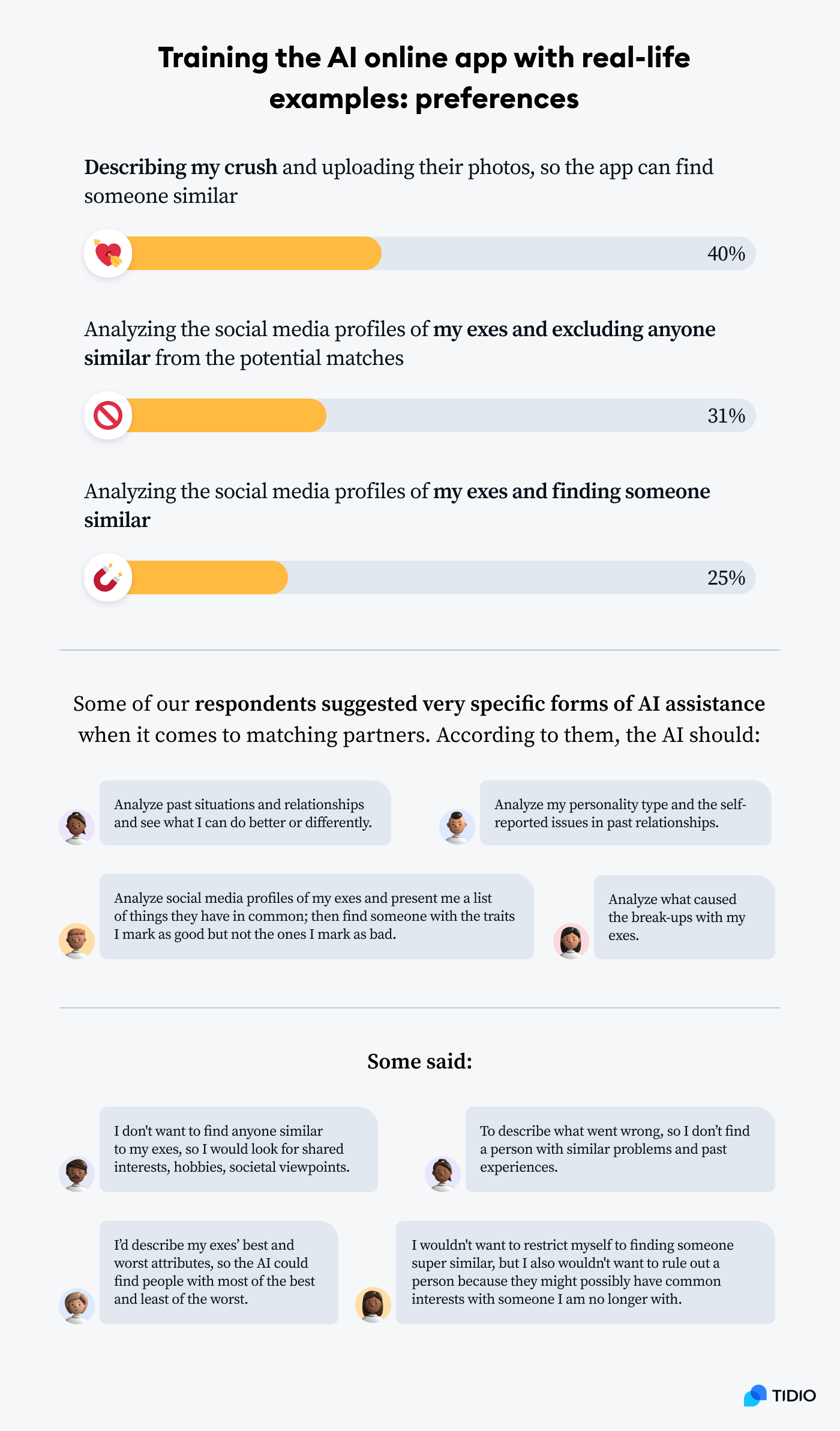
It turns out that all three options are not only justifiable but viable from a psychological point of view.
Yoobin Park, a researcher from the University of Toronto, said:
“In every relationship, people learn strategies for working with their partner’s personality. If your new partner’s personality resembles your ex-partner’s personality, transferring the skills you learned might be an effective way to start a new relationship on a good footing.”
Geoff MacDonald, the co-author of the study, adds:
“The degree of consistency from one relationship to the next suggests that people may indeed have a ‘type’.”
Essentially, whether you train the AI to find someone similar, or completely different from your ex, depends on your experiences with them.
How far will you go for love?
…or maybe, the question should be: what data are you willing to share for a promise of a perfect partner?
After all, apps that deliver highly personalized results must have access to private data in return.
Our respondents said that they would never share financial information (49%), DNA (39%), mental health information (35%), or their sexual interests and kinks (33%) with an online dating app.
However, 70% would change their minds and share their personal data…in exchange for a promise to meet a perfect match
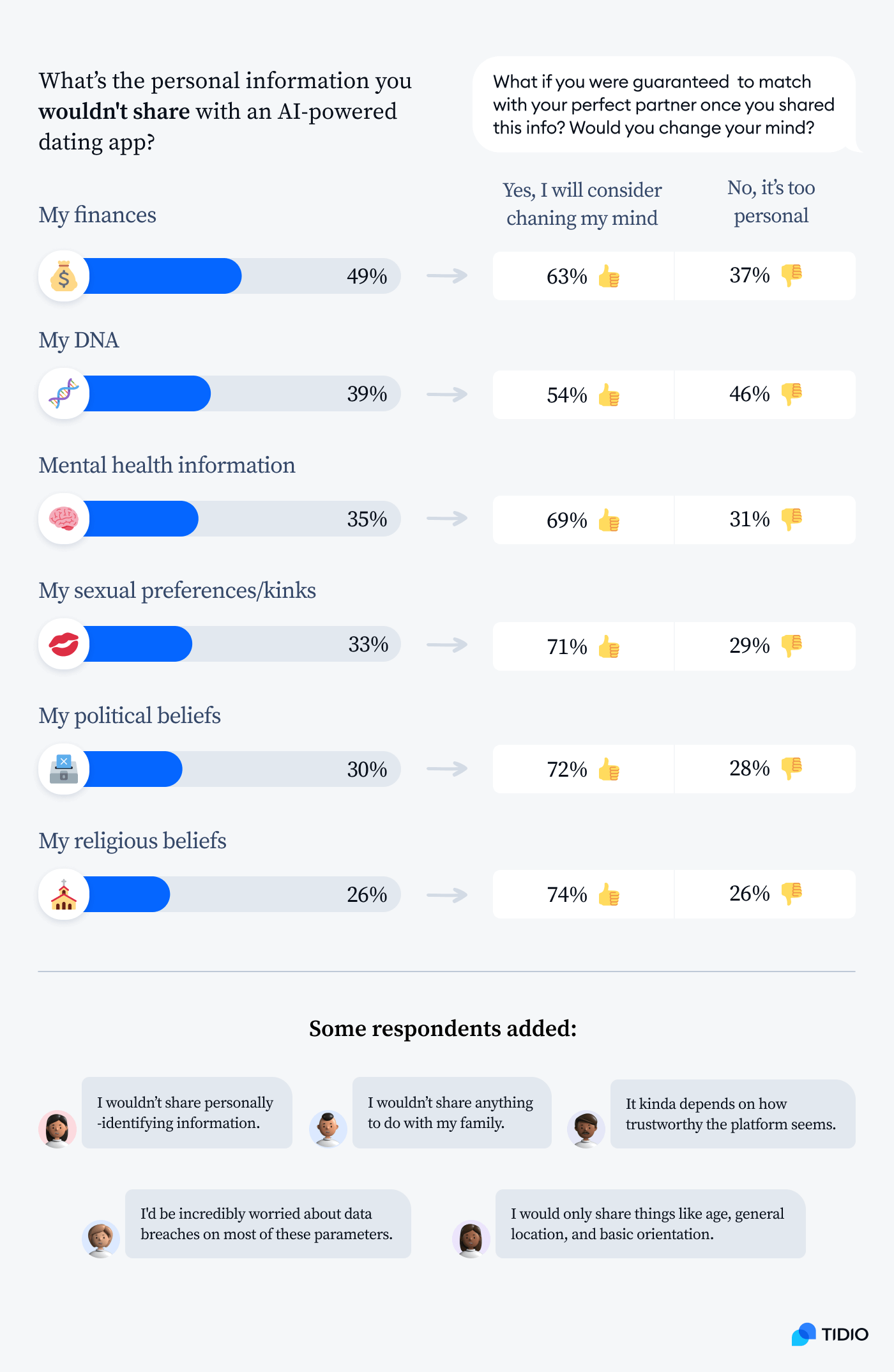
And even though some options were more arguable (46% wouldn’t share their DNA even for a promise of a perfect match), it turns out that people are willing to trade many personal pieces of information if they are promised to meet their dream partner.
Can AI help us live happily ever after?
Ok—
So you use an ideal AI dating app with advanced filtering options and training. You share your data and rate the candidates. Finally, the app chooses a perfect match for you!
After a few fruitful chats, and a few AI suggestions to meet in person, you go for an offline date. You spend a tremendous time, and you really start thinking that something good might come out of it.
But suddenly, the AI suggests breaking up with your date. Would you do it?
Or would you start wondering whether the AI got involved in your love life a little bit too much, just like in a popular Black Mirror episode?
Our survey respondents were divided:
- Almost half of them (48%) wouldn’t break up with the person they like, even if the AI told them to do so, but they would become more cautious and look out for red flags
- On the other hand, 45% said that they wouldn’t take advice from AI if they met someone they really liked
- Only 7% said they would break up with the person immediately
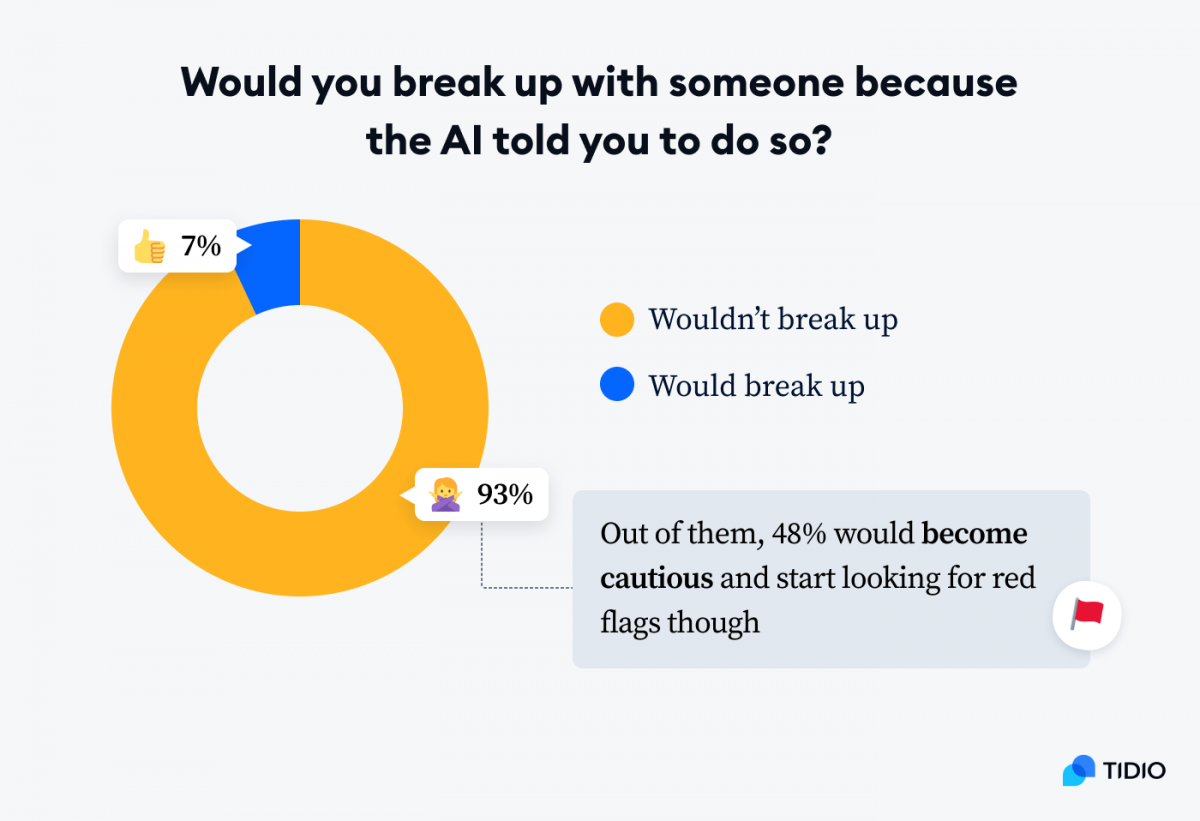
On top of that, people who consider themselves successful when it comes to their love life seem to trust their own feelings a tiny bit more than those who consider their love lives unsatisfactory.
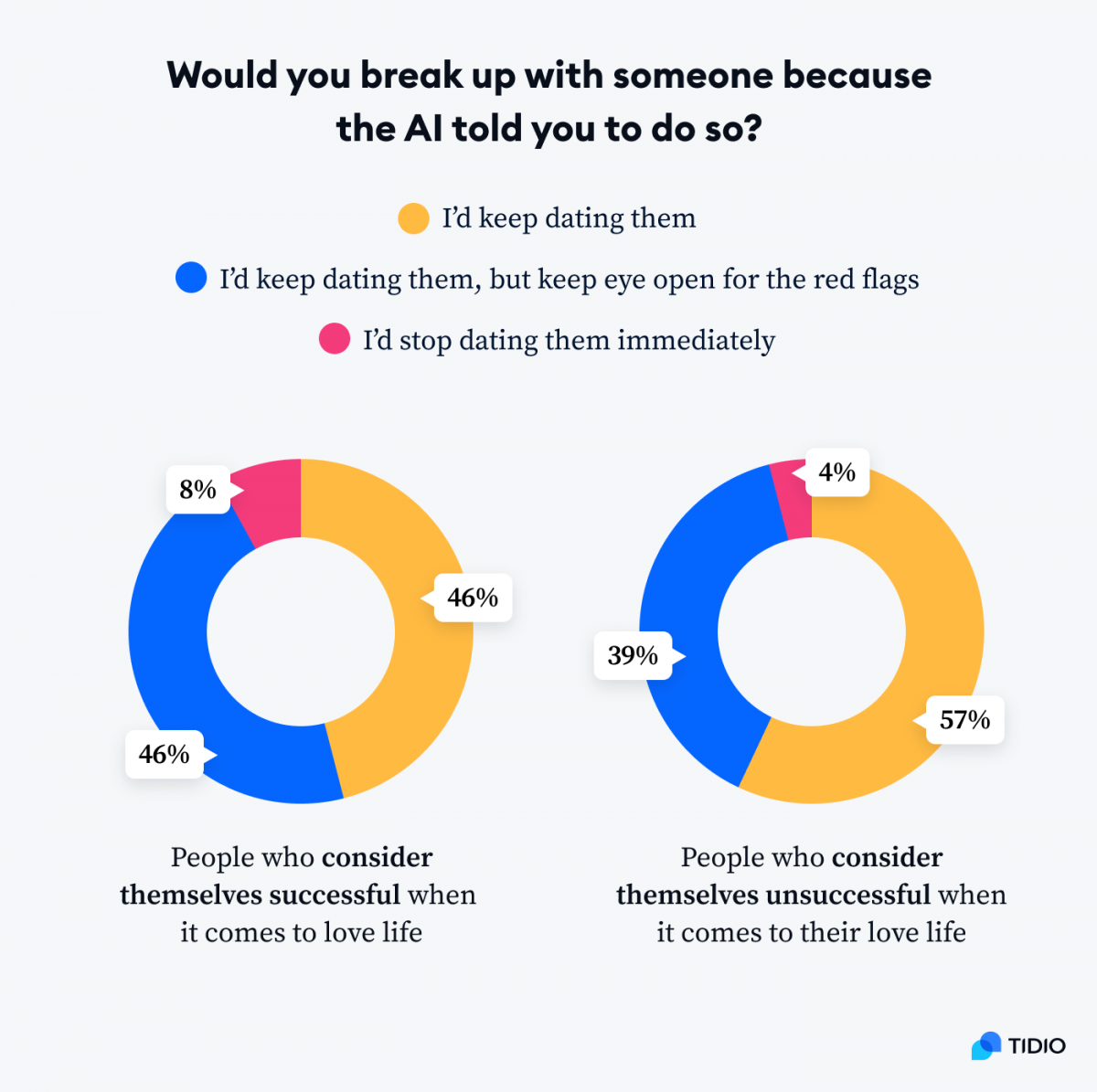
Out of the “lucky in love group,” 46% of them would choose to stay in the relationship and not consider taking the AI advice.
On the other hand, more than half of the “unlucky in love” group (57%) would not immediately break up with the partner but would become more conscious about them due to the advice of the AI.
This might be the right approach. Being cautious about whom you date (even if they seem perfect!) is always reasonable, and even more so when you meet your dates online. But what if the AI dating apps of the future could actually predict if your match is a potential scammer based on their profile and in-app behavior? This feature could even prevent real-time tragedies, like the one of the Tinder Swindler, an infamous scammer who swindled millions of dollars from multiple women he met on the app. And even though Simon Leviev (because that’s his real name) is currently banned from Tinder, it’s not a surprise that many people wonder how many similar individuals still navigate the complex world of online dating apps.
Maybe listening to AI’s advice is not always a bad idea?
If the app failed to meet their expectations when it comes to the match, 75% of respondents would add a new data set and restart the matchmaking
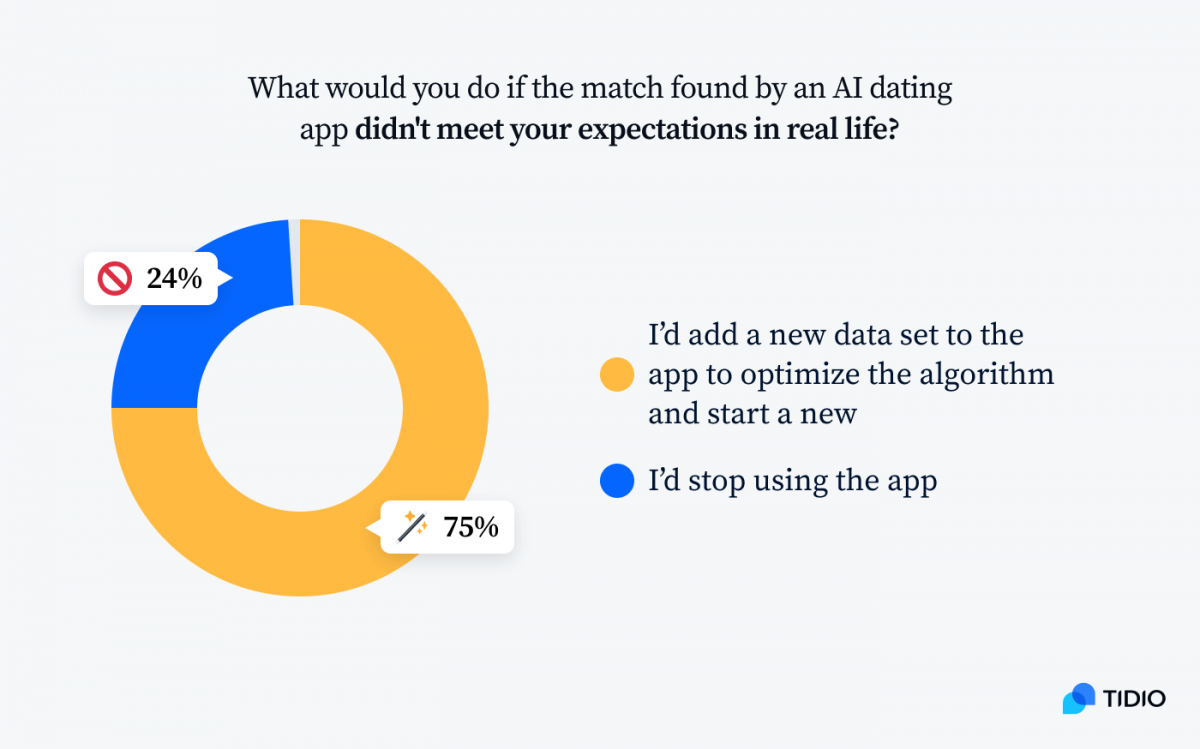
This means that people are becoming more likely to consider AI dating apps trustworthy and give them a second chance if the expectations are not met.
This claim was confirmed in a more straightforward question:
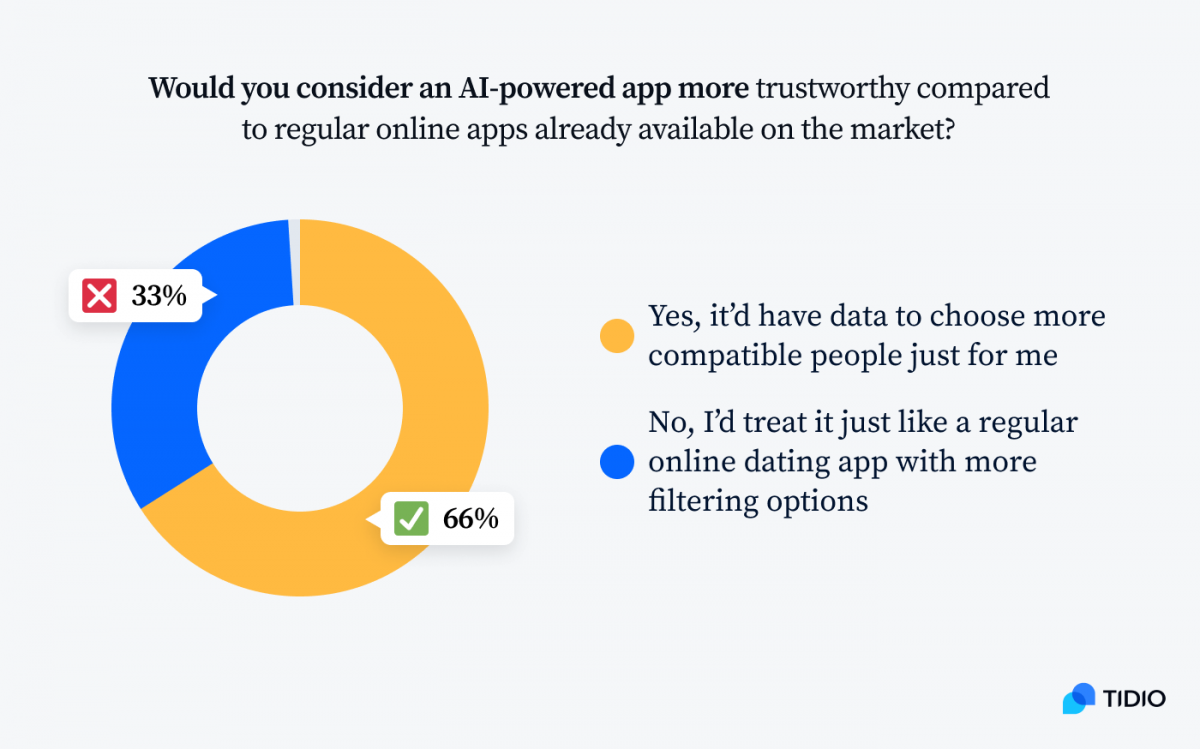
Interestingly enough, our respondents confirmed that the level of trust towards highly advanced AI dating apps of the future is 22% higher than for the options available on the market today (44%).
The future of dating AI
We are willing to share our personal data for the sake of love. We expect highly developed personalization algorithms when it comes to matchmaking. On top of that, we want to train the AI dating apps, so they provide us with partners we are attracted to. It seems that AI taking over the dating industry is inevitable.
What can we expect?
About 39% of respondents would spend up to $40 for an AI dating app that guarantees to find at least one personalized match per month
One-fourth of survey participants (25%) would spend anywhere between $40 and $80 per month.
Only 4% of them would spend $80 and $100 per month, and even less (1%) would invest splurge more than $100 a month in such an app.
Almost 30% declare that they wouldn’t spend money on it at all.
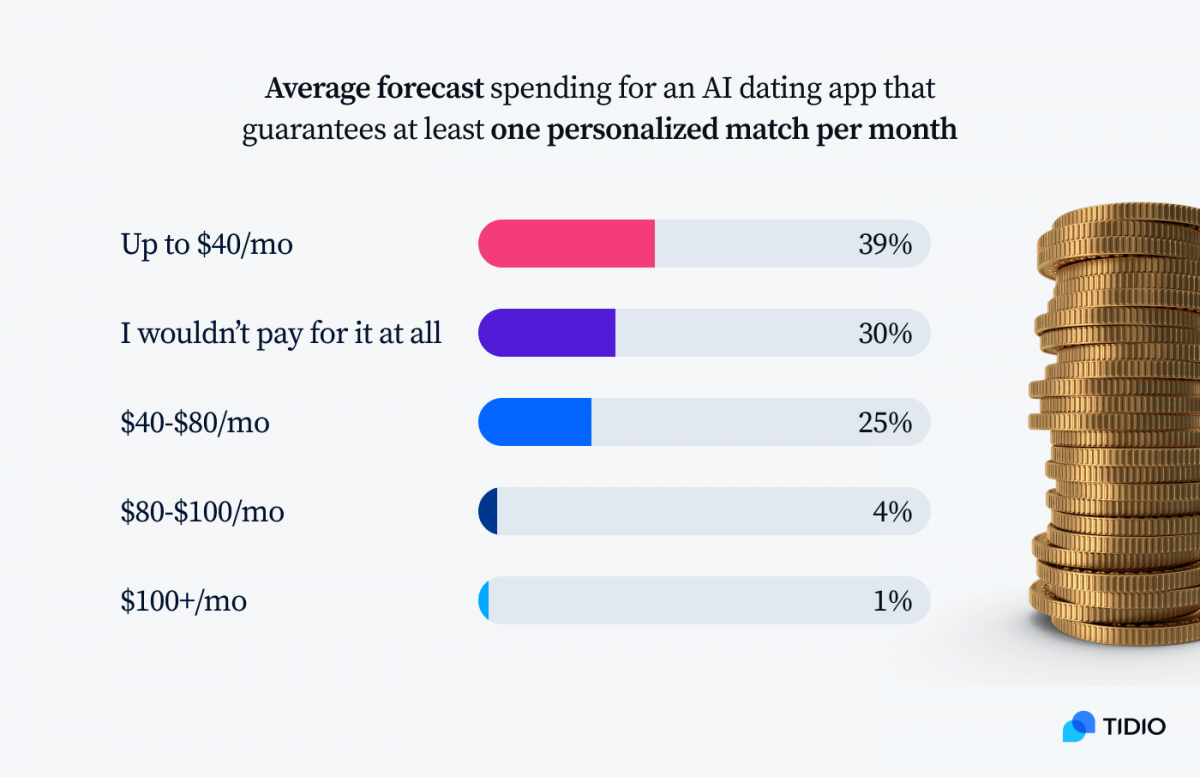
This means that, on average, people wouldn’t want to spend much more than they do now ($15-$30 a month as of today), even if the app would use more advanced technologies.
At the same time, 60% of respondents believe that it’s likely that AI-powered apps will choose partners for us in the future
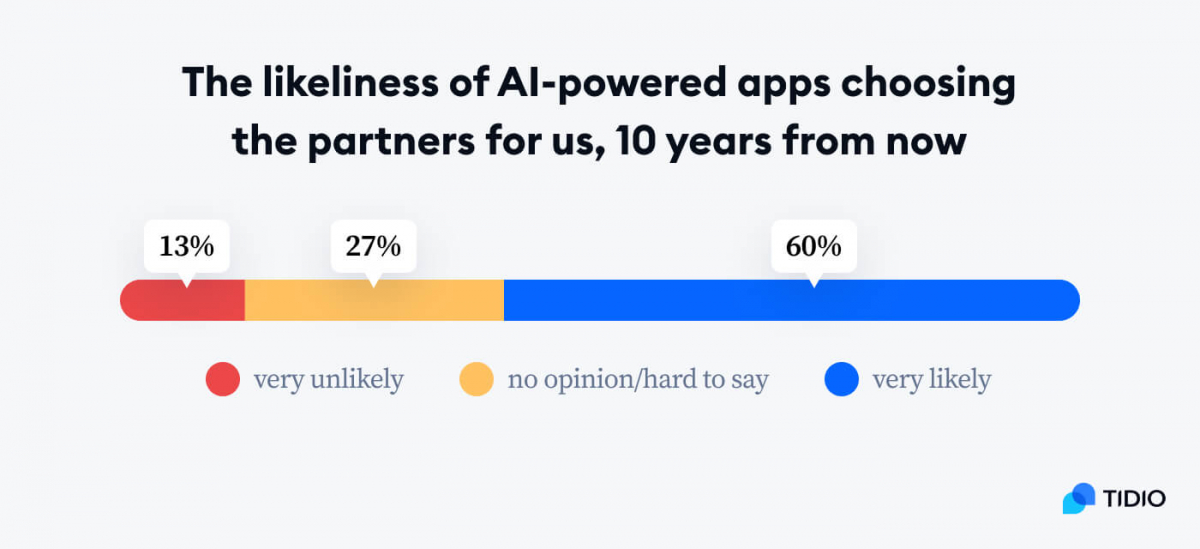
One thing is certain—the more AI expands, the more our physical and digital worlds intersect. As companies such as Facebook, Disney, and Apple invest in developing the metaverse, a question appears about the new rules of dating in virtual reality.
Is it possible that the online dating experience will move to the metaverse for good? Or maybe, creating a perfect, virtual partner will be more tempting than trying to find someone “good enough” in the physical world?
Our respondents answered this question.
More than half of survey participants (52%) would prefer to meet someone in real life than to create a perfect partner in a virtual world.
At the same time, 31% would willingly get engaged with a VR partner and 16% wouldn’t mind having both.
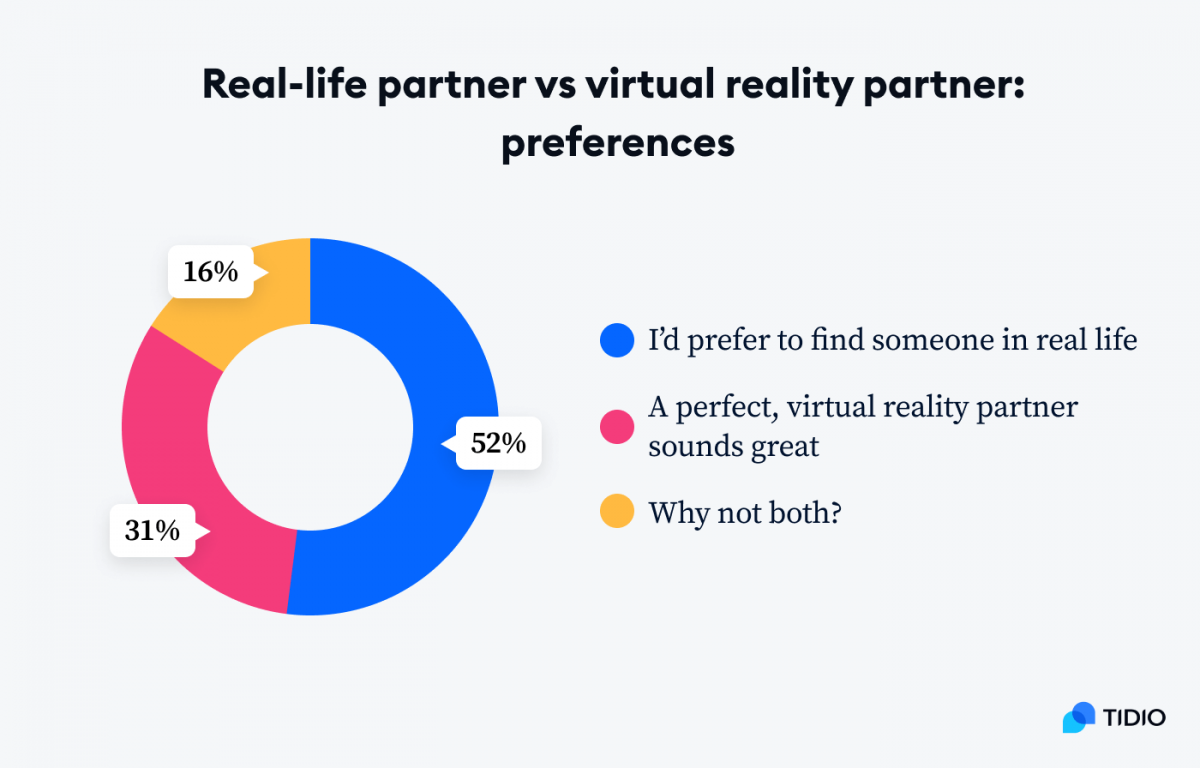
Out of the people who are married, however, as many as 43% would prefer to create a perfect virtual partner, as compared to 11% of singles and 22% of those, who are in an open relationship/marriage.
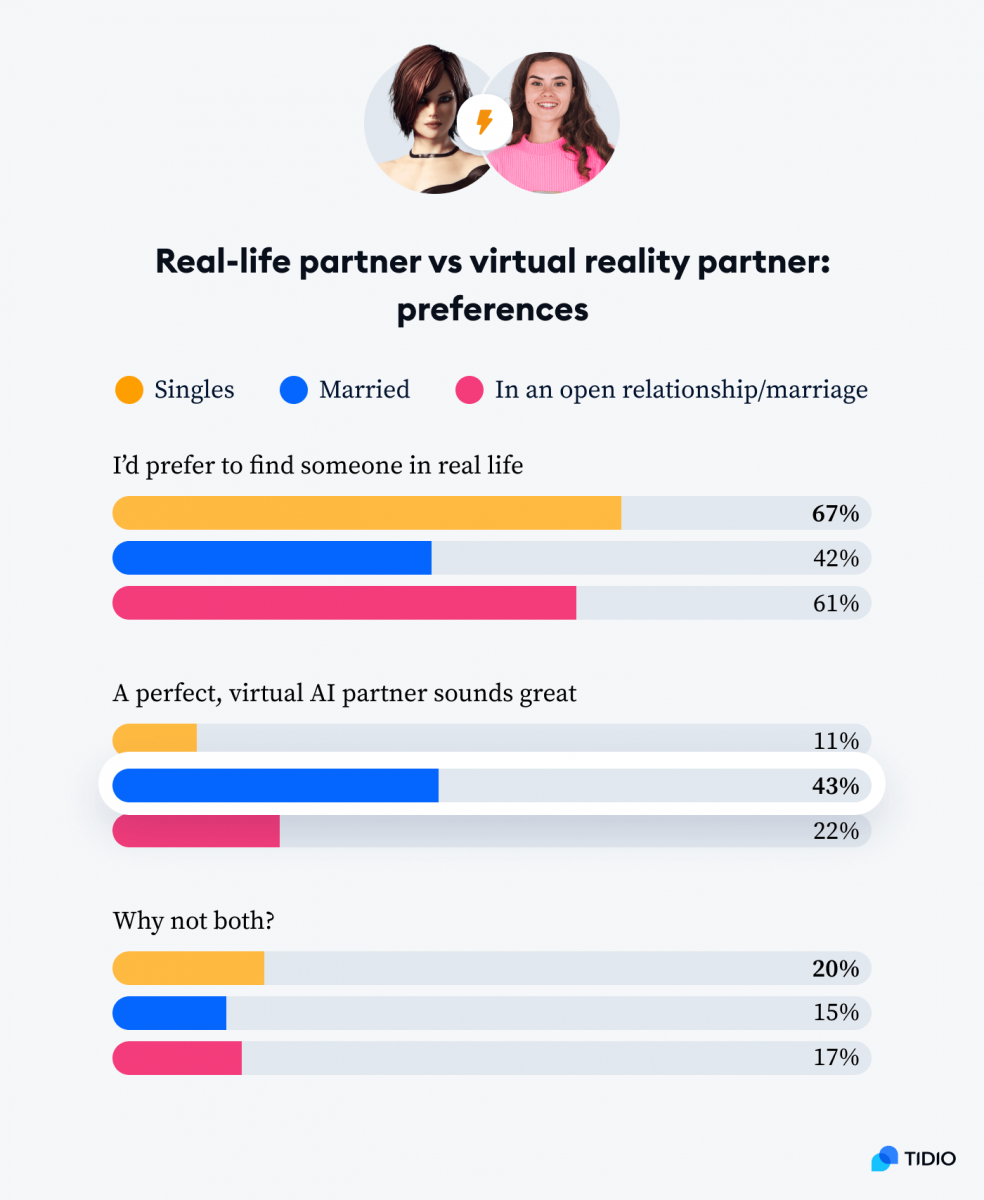
This suggests that singles hope that artificial intelligence would help them find a partner in real life. On the contrary, married people would want the AI to help them create a virtual partner, so they can experience the relationship outside their marriage.
What’s even more interesting, men are more willing to engage in a relationship with a VR partner (35%) as opposed to women (27%).
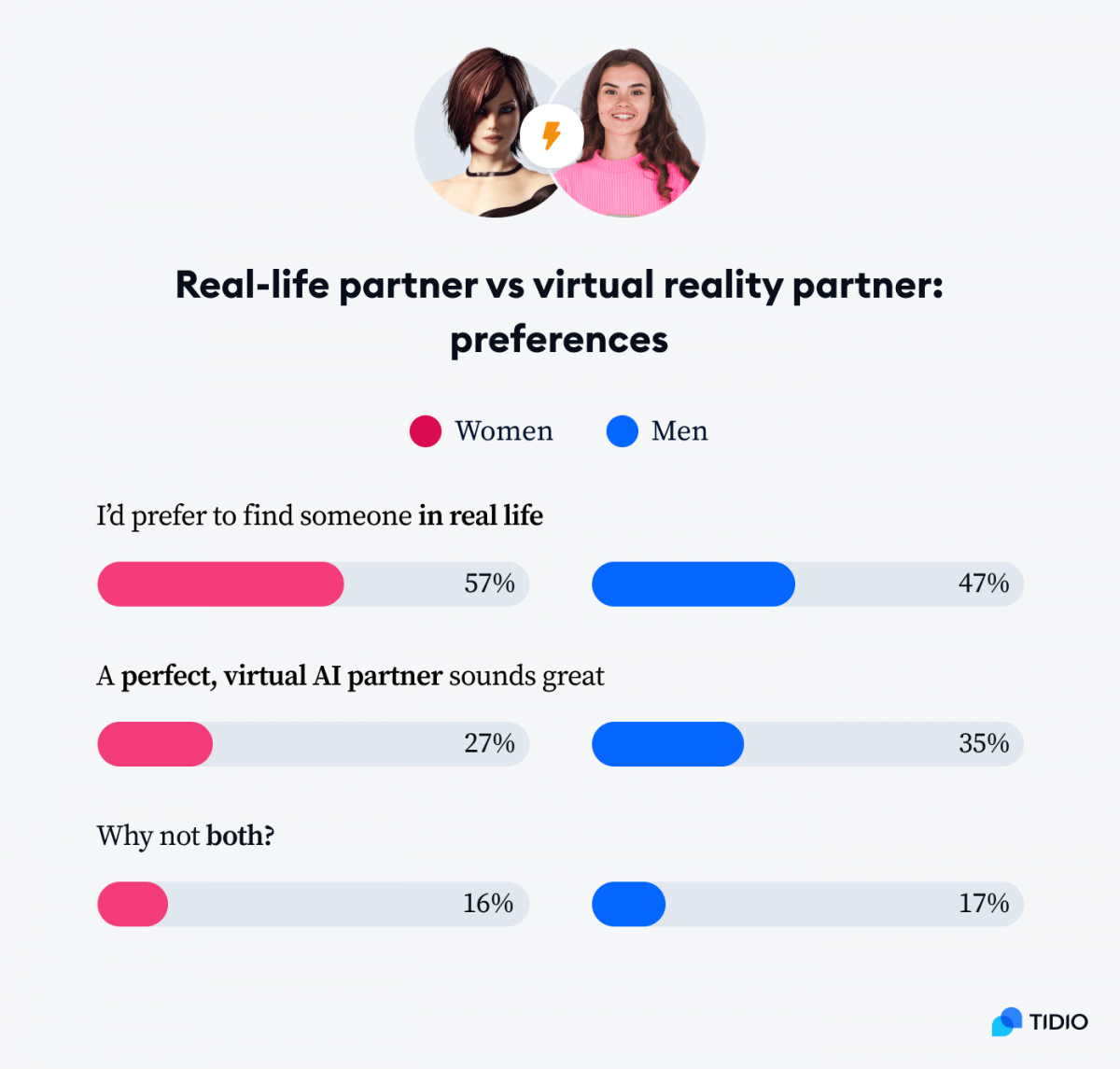
This is in line with the artificial intelligence trends study that revealed that as many as 43% of men are open to falling in love with an AI.
Is this an indicator that we can expect more human-AI love stories, straight out of a fantasy movie?
We might find out sooner than we expect.
Love in the age of AI: conclusions
When we try to add AI and emotions to the same mix, the results might be either scary or astonishing. Our study findings, however, prove that for many people who use dating apps, an advanced AI could make things easier.
The benefits may include finding someone who is a better match and being more comfortable with their search for love and relationships. In fact, this might be the main reason why many people are willing to exchange their personal information for the promise of an ideal partner.
And while the question of how we will navigate our AI-curated relationships in real life might still be uncomfortable to ask, one thing is pretty certain. In the future, AI will continue to assist us in searches for very human relationships.
Sources:
- Love in the time of algorithms: would you let artificial intelligence choose your partner?
- Digital matchmaker: almost half would trust AI to pair them with someone compatible
- AI is the new frontier for dating apps
- AI in Dating: Can Artificial Intelligence Algorithms Help You Find Love?
- Adult Attachment and Online Dating Deception: A Theory Modernized
- Dating Apps Use Artificial Intelligence to Help Search for Love
- Consistency Between Individuals’ Past and Current Romantic Partners’ Own Reports of Their Personalities
- Gender Differences in Mate Selection: Evidence From a Speed Dating Experiment
- The Virtues and Downsides of Online Dating
- The Rules of Dating, According to Gen Z
- How Social Media Contributes to Body Dysmorphic Behavior
- Marital Satisfaction and Break-Ups Differ Across On-Line And Off-Line Meeting Venues
- The Tinder Swindler
- Metaverse: Would You Remain Yourself in a Virtual World?
- Will AI Take Your Job? Fear of AI and AI Trends
- Online Dating Services Market Analysis
- Why Tinder Has a Lot of Positives To Shout About
- Here’s How Much the Best Dating Apps Cost
- DNARomance
Methodology:
For this study about AI, love, and dating, we collected answers from 1191 respondents. We used Amazon’s Mechanical Turk and Reddit.
Respondents were 51% males, 48% females, and less than 1% preferred not to disclose the gender they identify with. They had to answer 23 questions—the majority of which were yes/no and multiple-choice questions. The survey had an attention check question.
Fair Use Statement:
Has our research helped you learn more about AI technology in the context of dating? Feel free to share statistics from this study. Just remember to mention the source and include a link to this page. Thank you!

